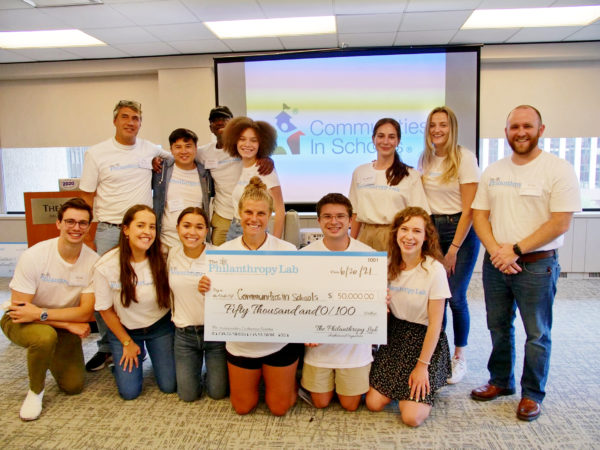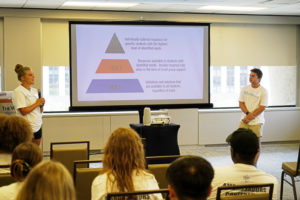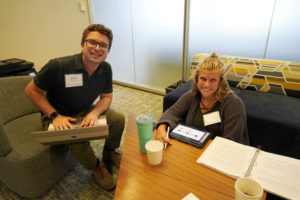
TCU Honors seniors, Meg Wilhorn and Jack Sewell (center), hold the $50,000 check they secured for the Communities in Schools (CIS), the nonprofit they advocated for at The Philanthropy Lab national conference in June.
TCU Honors seniors Meg Wilhorn and Jack Sewell represented TCU, the John V. Roach Honors College and the nonprofit, Communities in Schools, at The Philanthropy Lab national conference held in June. The goal of the conference was for representatives to learn more about giving and to participate in debates that awarded three $50,000 grants.
The conference, which took place in Dallas over the course of four days, brought together representatives from 15 universities where courses sponsored by The Philanthropy Lab are taught. Students and recent alumni from Harvard, Notre Dame, Columbia, Stanford, Vanderbilt, Baylor, Wisconsin–Madison, Texas A&M, California–Irvine, Emory, Abilene Christian, Pennsylvania, Texas at Austin, Washington–Seattle and TCU participated in the conference.

Based on their work in the Spring 2021 Nature of Giving and Philanthropy Honors Colloquium, Wilhorn and Sewell advocated for Communities in Schools (CIS), a nonprofit that surrounds public school students with a community of support within the school, empowering them to stay in school and succeed in life. CIS was one of the five organizations TCU’s Nature of Giving and Philanthropy class allocated funding to during the spring semester. According to Wilhorn, “We chose to bring CIS to the conference because we value the work that CIS social workers are doing in schools. Placing social workers in public schools to connect students and their families with community resources is an excellent way to address students’ individual needs.”
Over the course of three days, students discussed the concept of “responsibility in giving” and what qualities were considered regarding the organizations they desired to support. Each university prepared an eight-minute presentation and then addressed questions. Eventually, students voted on which nonprofits should advance to the final round of deliberations. Communities in Schools was chosen as one of nine finalists.
In the final round, participants discussed the finalists in greater detail, weighing and debating the merits of each organization. Ultimately conference participants chose to give $50,000 grants to CIS, OnRamp (nominated by Texas A&M’s representatives), and Her Future Coalition (nominated by the University of Texas–Austin representatives).

In addition to the gift from the spring 2021 Nature of Giving and Philanthropy Honors Colloquium ($30,000), TCU Honors students have helped secure $80,000 for Communities in Schools in the past six months. The funds will allow Communities in Schools to expand into two additional schools this coming academic year.
TCU alumna Rachel Peters Kreidler ’08 is the Chief Development Officer for Communities in Schools and said “From the beginning, I was incredibly impressed with Jack, Meg and Lauren Rasmussen’s ‘21 thorough research and hard-hitting questions — they could easily hang with the most established of funders. The students are a credit to TCU and embody what it means to be a horned frog in today’s world!”
The conference also featured faculty facilitators and philanthropists from across the U.S., including Dr. Ron Pitcock, who teaches the TCU honors colloquium and currently serves as interim dean of the John V. Roach Honors College, and TCU alum Suzanne Stone ’92, who is the Chief Strategic Solutions & Programs Officer at the Livestrong Foundation.
The John V. Roach Honors College at TCU is pleased to partner with the Philanthropy Lab, whose primary goal is to ignite students’ interest and participation in philanthropy. The initiative engages college students in philanthropy by giving them the tangible responsibility of directing real money to nonprofit organizations in the context of full-credit undergraduate courses.